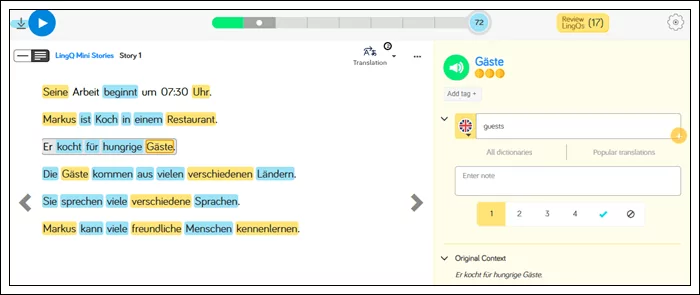The TestDaF: How LingQ Prepared Me For It
In October I decided to take the TestDaF, a German exam designed to test academic German skills.
The November signup deadline had already passed, and that was great – I had a lot of German to refresh. In fact, as much as I didn’t want to admit it, I was downright rusty.
Over the next few months, though, I diligently studied every day leading up to the exam in February 2020. And since LingQ was such a big part of my routine, I thought it was only fair to explain how you too can use this platform to get prepared for standardized tests in German.
The TestDaF and LingQ
Structure of the TestDaF
The TestDaF comes in four parts: reading, listening, writing, and speaking, in that order. It’s not like some tests that let you take certain sections on a different day. Everything’s right after the other, though you do get short breaks between sections. The people taking the test with me actually voted to shorten the break time to get it over with!
Everything is oriented around academic German to some extent. That means you’ll be reading articles and listening to lectures that have something to do with studying at a German university. Of course, you’re not really thrown in the deep end and expected to perform at exactly the level of native speakers. The speaking section is simplified and spoken clearly, and you only have to write a brief essay for the writing section.
The Power of Reading for Advanced Students
I was not going into this test cold. I studied German several years ago as a minor in college, and since then I’ve kept it active through regular reading and listening in my spare time, as well as working as a freelance translator.
And so you could say I was an “advanced” student. The thing is, though, I still had a lot to learn for the test.
Specifically, I needed to learn more words. Writing a bunch of articles on German grammar for LingQ helped me solidify my German grammar well enough that I didn’t have much to review on that front, but I needed to become able to understand and use German vocabulary that I simply didn’t know yet.
It wasn’t going to come through listening. I love listening to German podcasts, but even if you can guess the meaning of a new word as you hear it, you’ll definitely need to hear it a couple more times before it really sits in your memory.

With reading, though, you can pause and really take in the shape of the word. I’m also the type of person who frequently re-reads things even on the same page. I don’t just go line by line, seeing each word once. Especially if I’m reading in German, I tend to go over the sentences at least twice on each page before continuing.
Playing The Game
What I really liked about LingQ was that, since I already knew quite a few German words when I started, I got to rack up “known words” right and left. That was a great aspect of reading practice, and when I came across a new word it was cool picking that one out.
In effect, it felt like the platform itself was not only congratulating me for learning new words, it was praising me for any progress I made outside of LingQ. I was balancing three or four different study tools as well as just reading on my own with physical books, and so I could see that progress in LingQ as new words I’d learned popped up there too and I was able to mark them “known.”
Guessing the TestDaF Topics
Unlike English exams like the IELTS or TOEFL, there’s not a whole lot of material out there to help you prepare for the TestDaF. The Goethe-Institut only has a couple of sample exams on their website, and the newest of those is coming up on fifteen years old!
There are a couple of good textbooks you can buy, like TestDaF Training and Fit für den TestDaF, plus a couple of people have written and self-published their own guides as e-books for purchase.
Even if you know all about these resources, though, that’s only the tiniest sample of what the testers could throw at you. Basically, you need to be comfortable reading about these main topics:
University classes, internships. scholarships
Pollution, environmental protection, agriculture
The effect of technology on people
Gender equality, family structure
Employment trends
Remember, you don’t have to know a ton about all of these topics. However, you should try to have the vocabulary to read general overviews of each of them.
If you have absolutely no idea where to start, just go to the English Wikipedia pages about these different subjects and look for a German translation.
Reading Different Types of Writing
I tended to read from the same types of sources:
Deutsche Welle – International news written in a detached, formal style
Vice – news and cultural articles that tend to be written in an informal, even vulgar style
Der Spiegel – international news and opinion pieces in a formal style
Statista – Statistical data with some analysis pieces
WirtschaftsWoche – economics news
GuteFrage – A question and answer forum in informal German
The LingQ news feed was a great place to find current articles to import into lessons:

This was in addition to my hardcover books – translated Calvin and Hobbes collections, an old textbook of mine from college, and some books from Duden on how to improve your writing.
These covered different styles of writing over many different topics. The TestDaF requires you to write formally, but you need to understand and produce appropriately informal German during the listening and speaking tests. Doing all this reading was crucial to building those skills.
And with LingQ, it was super simple to load each one in! I just copied and pasted the articles and edited any weird formatting that came up.
Improving My Other Skills
Although I think the huge amount of reading was the best active studying I did, I still worked on the rest of my German using other platforms. I constantly had German audio playing in my car or in headphones during my lunch breaks at work or when I was grocery shopping (you’d be surprised how much listening you can add up by turning grocery runs into German time).
Glossika, Speechling, and iTalki were all helpful for speaking practice, and the LingQ grammar guide was good for making sure that my sentence-level grammar was in top shape.
In fact, I thought of speaking practice as so important that I ended up reading the vast majority of my LingQ articles aloud. The effect from this was slow but noticeable – after about two months, I felt very smooth switching into spoken German and rarely stumbled over my words.
One last tip: sometimes I did my best to sight-translate live as I was reading. That means reading a German text for the first time and speaking an English translation aloud, trying to make it sound as natural as possible. This tests your reading speed as well as your vocabulary knowledge – if you just “kinda” know what a word means, it’s easy to skip over it while reading silently. But when you’re translating the passage into another language, your translation screeches to a halt as soon as there’s a word you don’t know perfectly!
Conclusion
Hopefully this article shows you the importance of setting aside a good chunk of time before the exam to get familiar with it and develop a good study routine. I definitely didn’t start out in the same groove I was in at the end.
The most important thing is to never settle for the amount of German you know today. Always be striving to test yourself and learn a little bit more!
***
Check out LingQ today to discover how to learn German from content you love!
LingQ is available for desktop as well as Android and iOS. Gain access to thousands of hours of audio and transcripts and begin your journey to fluency today.

Alex Thomas wears many hats when it comes to languages, including translating, teaching, voice recording, and writing. He currently lives in the USA.



